大学英语 副词
- 格式:ppt
- 大小:2.44 MB
- 文档页数:32
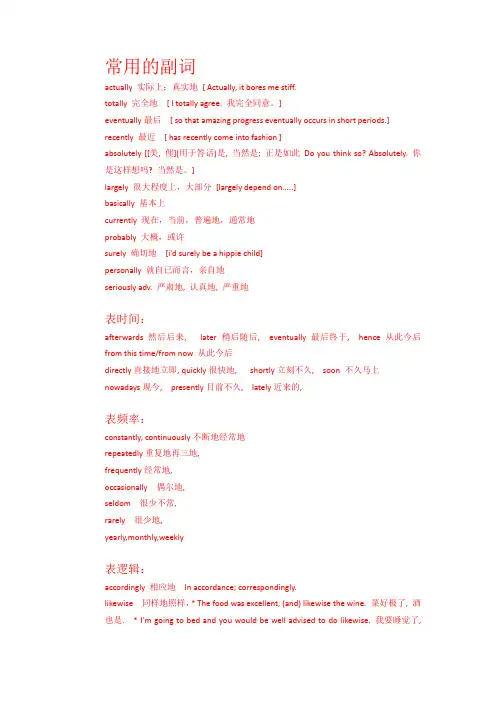
常用的副词actually 实际上;真实地[ Actually, it bores me stiff.totally 完全地[ I totally agree. 我完全同意。
]eventually最后[ so that amazing progress eventually occurs in short periods.] recently 最近[ has recently come into fashion ]absolutely [[美, 俚](用于答话)是, 当然是; 正是如此Do you think so? Absolutely. 你是这样想吗? 当然是。
]largely 很大程度上,大部分[largely depend on.....]basically 基本上currently 现在,当前,普遍地,通常地probably 大概,或许surely 确切地[i'd surely be a hippie child]personally 就自已而言,亲自地seriously adv. 严肃地, 认真地, 严重地表时间:afterwards然后后来, later稍后随后,eventually最后终于,hence 从此今后from this time/from now 从此今后directly直接地立即, quickly很快地,shortly立刻不久,soon 不久马上nowadays现今,presently目前不久,lately近来的,表频率:constantly, continuously不断地经常地repeatedly重复地再三地,frequently经常地,occasionally偶尔地,seldom很少不常,rarely很少地,yearly,monthly,weekly表逻辑:accordingly 相应地In accordance; correspondingly.likewise同样地照样,* The food was excellent, (and) likewise the wine. 菜好极了, 酒也是.* I'm going to bed and you would be well advised to do likewise. 我要睡觉了,你最好也睡吧.accordingly 因此,consequently因此,hence因此, thereby因此由此merely只不过仅仅merely a flesh wound.仅仅是皮肉伤furthermore, moreover, besidesnevertheless, nonetheless; however仍然* He is often rude to me, but I like him nevertheless.他时常对我粗鲁无礼, 但我还很喜欢他.In spite of sth;尽管,regardless 无论如何continues to work regardless.不顾后果地继续工作表语气:actually, definitely, undoubtedly,absolutelynormally, generally,wholly完全地彻底地likely或许很可能,virtually事实上实质上,naturally,necessarily必要地,similarly类似地同样地simply简单地conversely 相反地颠倒地respectively 逐个地分别的,individually个别地* speak to each member of a group individually 对组里每个人逐个地说.separately个别地单独地roughly概略地大致地,somewhat稍微有点表程度:approximately, nearly,largely, mainly, mostly, primarily,increasingly, , partly,scarcely, considerably, extremely, enormously, greatly,3、常见形容词absent from 不在,缺席abundant in 富于alien to 与...相反angry with sb at/about sth 生气,愤怒anxious about/for 忧虑,担心appropriate for/to 适当,合适applicable to 适用于apt at 聪明,善于apt to 易于ashamed of 羞愧,害臊approximate to 近拟,接近aware of 意识到abailable to sb for sth 可用,可供bare of 几乎没有,缺乏bound for 开往...capable of 能够careful of/about/with; 小心,注意certain of /about 确信,肯定about/in doing characteristic of 特有,独特clear of 没有,不接触clever at 善于close to 接近,亲近comparable to/with 可比较conscious of 察觉到,意识到consequent on 随之而来considerate towards 体谅,体贴contemporary with 与...同时代content with 满足于contrary to 违反counter to 与...相反crazy about 热衷,着迷critical of 挑剔,批评curious about 好奇,想知道distinct from 种类(风格)不同doubtful of /about 怀疑east of 在...东面equal to 相等,胜任equivalent to 等于,相当于essential to/for 必不可少expert at/in/on 善于faithful to 忠实于familiar to sb 为...所熟悉familiar with sth 熟悉,通晓fatal to 致命的favourable to 支持,赞成favourable for 有帮助的fearful of 惧怕fit for 适于foreign to 非...所原有fond of 喜欢free of /from 未受...;免费free with 康慨,大方guilty of 有...罪的hungry for 渴望ignorant of 不知道impatient at sth. 不耐烦impatient of 无法容忍with sb independent of 不受...支配impatient for 急切,渴望indifferent to 无兴趣,不关心indignant with sb. 愤慨inferior to 级别低于,不如ab/about sth innocent of 无...罪,无辜intent on 专心于invisible to 不可见的jealous of 嫉妒keep on 爱好,很喜欢liable for 对...有责任liable to 易于loyal to 忠于mad at/with sb. 生气,愤怒mad with 因...发狂next to 下一个,其次necessary to /for 必要的opposite to 在对面open to 不限制,开放的particular about 挑剔,讲究parallel to 与...平等,类似peculiar to 独特的,独有的patient with 有耐心prior to 在...之前popular with 受...喜爱,爱戴representative of 代表...的relative to 与...有关rich in 富于responsible for 负责,是...原因sensitive to 对...敏感sensible of 觉查到sick of 厌恶,厌倦short of 缺少skilled at /in 善于similar to 相似sufficient for 足够的subject to 受制于,易于superior to 优于,级别高于suitable for/to 适合于suspicious of 怀疑sure of /about 对...有信心,确信typical of 是典型的,特有的tired of 对...不在感兴趣votal to 对...关系重大uncertain of /about 不确知mad about/on 狂热迷恋void of 没有,缺乏。
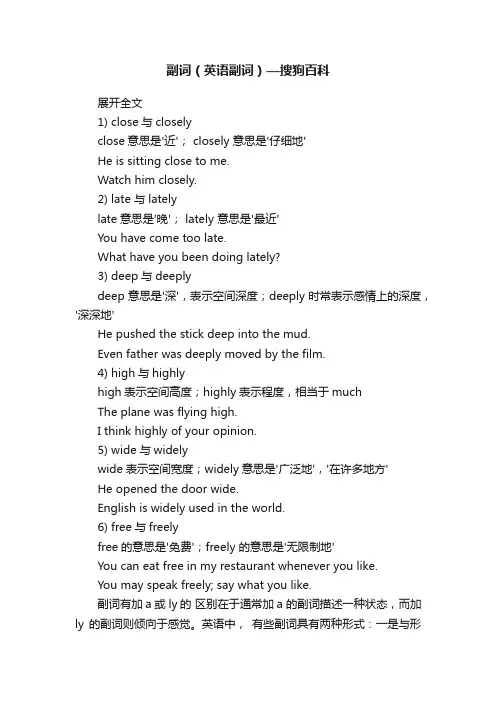
副词(英语副词)—搜狗百科展开全文1) close与closelyclose意思是'近'; closely 意思是'仔细地'He is sitting close to me.Watch him closely.2) late 与latelylate意思是'晚'; lately 意思是'最近'You have come too late.What have you been doing lately?3) deep与deeplydeep意思是'深',表示空间深度;deeply时常表示感情上的深度,'深深地'He pushed the stick deep into the mud.Even father was deeply moved by the film.4) high与highlyhigh表示空间高度;highly表示程度,相当于muchThe plane was flying high.I think highly of your opinion.5) wide与widelywide表示空间宽度;widely意思是'广泛地','在许多地方'He opened the door wide.English is widely used in the world.6) free与freelyfree的意思是'免费';freely 的意思是'无限制地'You can eat free in my restaurant whenever you like.You may speak freely; say what you like.副词有加a或ly的区别在于通常加a 的副词描述一种状态,而加ly 的副词则倾向于感觉。
英语中,有些副词具有两种形式:一是与形容词同形;二是由该形容词后加-ly构成(以下称形容词形副词和-ly形副词)。

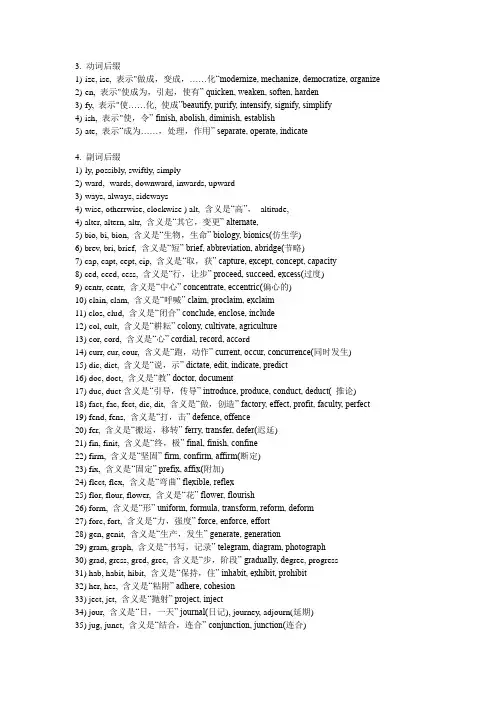
3. 动词后缀1)-ize, ise, 表示"做成,变成,……化“modernize, mechanize, democratize, organize2)-en, 表示"使成为,引起,使有” quicken, weaken, soften, harden3)-fy, 表示"使……化, 使成”beautify, purify, intensify, signify, simplify4)-ish, 表示"使,令” finish, abolish, diminish, establish5)-ate, 表示“成为……,处理,作用” separate, operate, indicate4. 副词后缀1)-ly, possibly, swiftly, simply2)-ward, -wards, downward, inwards, upward3)-ways, always, sideways4)-wise, otherrwise, clockwise ) alt, 含义是“高”,altitude,4) alter, altern, altr, 含义是“其它,变更” alternate,5) bio, bi, bion, 含义是“生物,生命” biology, bionics(仿生学)6) brev, bri, brief, 含义是“短” brief, abbreviation, abridge(节略)7) cap, capt, cept, cip, 含义是“取,获” capture, except, concept, capacity8) ced, ceed, cess, 含义是“行,让步” proceed, succeed, excess(过度)9) centr, centr, 含义是“中心” concentrate, eccentric(偏心的)10) clain, clam, 含义是“呼喊” claim, proclaim, exclaim11) clos, clud, 含义是“闭合” conclude, enclose, include12) col, cult, 含义是“耕耘” colony, cultivate, agriculture13) cor, cord, 含义是“心” cordial, record, acc ord14) curr, cur, cour, 含义是“跑,动作” current, occur, concurrence(同时发生)15) dic, dict, 含义是“说,示” dictate, edit, indicate, predict16) doc, doct, 含义是“教” doctor, document17) duc, duct含义是“引导,传导” introduce, produce, conduct, deduct( 推论)18) fact, fac, fect, dic, dit, 含义是“做,创造” factory, effect, profit, faculty, perfect19) fend, fens, 含义是“打,击” defence, offence20) fer, 含义是“搬运,移转” ferry, transfer, defer(迟延)21) fin, finit, 含义是“终,极” final, finish, confine22) firm, 含义是“坚固” firm, confirm, affirm(断定)23) fix, 含义是“固定” prefix, affix(附加)24) flect, flex, 含义是“弯曲” flexible, reflex25) flor, flour, flower, 含义是“花” flower, flourish26) form, 含义是“形” uniform, formula, transform, reform, deform27) forc, fort, 含义是“力,强度” force, enforce, effort28) gen, genit, 含义是“生产,发生” generate, generation29) gram, graph, 含义是“书写,记录” telegram, diagram, photograph30) grad, gress, gred, gree, 含义是“步,阶段” gradually, de gree, progress31) hab, habit, hibit, 含义是“保持,住” inhabit, exhibit, prohibit32) her, hes, 含义是“粘附” adhere, cohesion33) ject, jet, 含义是“抛射” project, inject34) jour, 含义是“日,一天” journal(日记), journey, adjourn(延期)35) jug, junct, 含义是“结合,连合” conjunction, junction(连合)36) labour, labor, 含义是“劳动,工作” labourer, elaborate, collaborate37) lect, leg, lig, 含义是“挑选,采集” collect, selec t, lecture38) lif, liv, 含义是“生活,生存” life, alive, live39) loc, 含义是“场所,位置” location, dislocate(脱位)40) long, leng, ling, 含义是“长的” length, prolong, linger41) loqu, locut, 含义是“说话” colloquial, eloquent,42) mand, mend, 含义是“命令” command, demand, recommend43) man, manu, 含义是“手,手法” manage, manual44) memor, menber, 含义是“记忆” memory, remember, memorial45) mind, ment, 含义是“心” mind, remind, mental46) merc, merch, 含义是“贸易” commerce, merchant47) meas, mens, meter, metr, 含义是“测量,度量” measure, meter, diameter48) min, 含义是“小” diminish, minority49) miss, mit, 含义是“派遣,送” mission, dismiss, transmit, missile50) mob, mot, mov, 含义是“动” movement, motion, mobile, remove51) nect, nex, 含义是“捆扎” connect, disconnect, annex(合并)52) not, 含义是“记号,注意” note, denote, annotation(注释)53) onom, onym, 含义是“名字” synonym, antonym, anonymous54) pair, par, 含义是“a)相同,对等b)准备” compare, prepare55) pel, puls, 含义是“追逐” expel, impel(推进)56) pend, pens, pond, 含义是“悬挂” depend, independent, expense(支付)57) phon, 含义是“声音” symphony, telephone, microp hone58) plac, 含义是“位置,场所” place, replace59) peopl, popul, publ, 含义是“人民,民众” public, republic, popular, people60) port, 含义是“搬运” export, import, deport(输送)61) press, 含义是“压,压制” pressure, express, oppress, impression62) prob, proof, prov, 含义是“实验,验证” pr ove, approve,63) quer, quest, quir, quis, 含义是“寻找,探问” inquiry, question, inquisition(调查,追究)64) rang, rank, 含义是“排列” arrange, rank,65) rect, right, rig, 含义是“正,直” correct, direct, erect66) riv, 含义是“河流,流远”,river, arrive, derive67) rupt, 含义是“破坏,毁坏” eru ption, bankrupt, corruption68) sci, 含义是“认识,知识” science, conscious69) scrib, script, 含义是“书写,记录” describe, script70) sens, sent, 含义是“感觉,情感” sensation, sentiment71) sign, 含义是“标记,符号” signal, signature, design72) sembl, simil, 含义是“相似,类似” similar, rese mble, assimilate(同化)73) soci, 含义是“结合,社交” social, association74) spec, spect, spitc, spis, 含义是“看,视” inspect, spectator, conspicuous, respect75) struct, 含义是“建筑,构造” structure, construct, instruct, destruction76) tect, teg, 含义是“遮蔽,掩盖” detect, protect77) temp, tens, 含义是“时间,时机” tense, contemporary, temporal78) tend, tes, tent, 含义是“倾向, 伸张” tendency, intension, extend, intend79) test, 含义是“证明,证实” testify, protest, contest(争论)80) text, 含义是“编织,构成” textile, texture, context81) tract, trail, 含义是“拖拉,吸引” attract, tractor, abstract, contract(收缩)82) tribut, 含义是“给予” contribution, distribute83) us, ut, 含义是“用,使用” usable, utilize, abuse84) vac, van, 含义是“空,虚” vacancy, vanity, evacuate(清空)85) vad, vas, wad, 含义是“走,去” invade, wade, evade(逃避)86) vers, vert, 含义是“旋转,反转” convert, inversion(倒转),reverse, divert(使转向)87) vid, vis, vey, view, 含义是“观看,看见” television, visible, evident, interview, survey88) viv, vit, 含义是“生,活” vivid, vital, survival,89) war, ward, 含义是“注意,保护” aware, wary(谨慎),ward(守护)90) way, 含义是“路” way, away, subway, always。

英语副词知识点笔记整理1.副词的定义副词(Adverb)是一种用来修饰动词、形容词、副词或全句的词类。
它可以表示时间、地点、程度、方式等概念,用于更具体地描述动作或状态。
2.副词的分类2.1根据修饰对象分类程度副词:如very(非常)、quite(相当)、extremely(极其),表示事物的程度。
时间副词:如now(现在)、soon(很快)、yesterday(昨天),表示事物的时间。
地点副词:如here(这里)、there(那里)、everywhere(到处),表示事物的地点。
方式副词:如quickly(迅速地)、carefully(小心地)、quietly(安静地),表示事物的方式。
2.2根据形式分类简单副词:由一个单词构成,如fast(快速地)、often(经常)、well(好)。
复合副词:由两个或更多单词组成,如upstairs(楼上)、on purpose(故意地)、in vain(徒劳地)。
3.副词的位置副词通常位于动词之后,形容词之前,例如:She speaks **fluently**.(她讲得流利。
)有些副词可以放在句首或句末,用于强调或表达特定的语气,例如:**Certainly**,I will help you.(当然,我会帮助你。
)4.副词的比较级和最高级大多数副词的比较级和最高级是在其前面加上more和most,例如:carefully(小心地)→more carefully(更小心地)→most carefully(最小心地)。
部分副词的比较级和最高级形式与形容词相同,例如:well(好)→better(更好)→best(最好)。
5.副词的用法注意事项注意区分副词和形容词的用法,形容词修饰名词,副词修饰动词、形容词或其他副词。
一些常见的副词形式不规则,例如:good(好)→well(好地)、bad(坏)→badly(坏地)。
在表示频率的副词中,通常将副词放在动词之前,例如:I often go to the park.(我经常去公园。
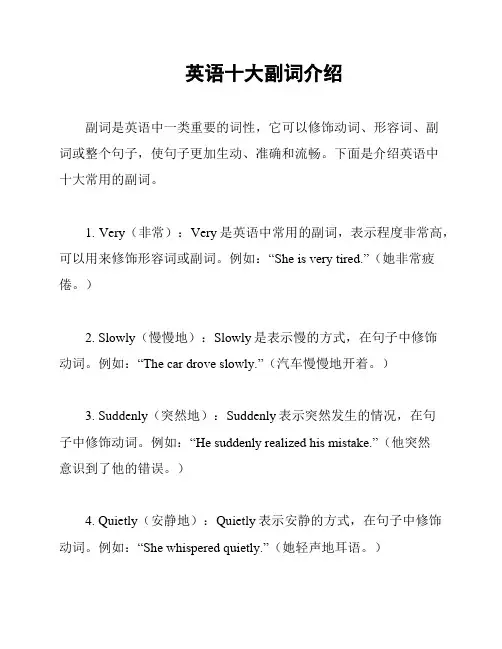
英语十大副词介绍副词是英语中一类重要的词性,它可以修饰动词、形容词、副词或整个句子,使句子更加生动、准确和流畅。
下面是介绍英语中十大常用的副词。
1. Very(非常):Very是英语中常用的副词,表示程度非常高,可以用来修饰形容词或副词。
例如:“She is very tired.”(她非常疲倦。
)2. Slowly(慢慢地):Slowly是表示慢的方式,在句子中修饰动词。
例如:“The car drove slowly.”(汽车慢慢地开着。
)3. Suddenly(突然地):Suddenly表示突然发生的情况,在句子中修饰动词。
例如:“He suddenly realized his mistake.”(他突然意识到了他的错误。
)4. Quietly(安静地):Quietly表示安静的方式,在句子中修饰动词。
例如:“She whispered quietly.”(她轻声地耳语。
)5. Clearly(清晰地):Clearly表示明确的方式,在句子中修饰动词或形容词。
例如:“He spoke clearly.”(他说话清晰明了。
)6. Really(真正地):Really表示真正的方式或程度,在句子中修饰形容词或副词。
例如:“I'm really tired.”(我真的很累。
)8. Carefully(小心地):Carefully表示小心的方式,在句子中修饰动词。
例如:“She handled the fragile vase carefully.”(她小心地处理着易碎的花瓶。
)9. Happily(快乐地):Happily表示快乐的方式,在句子中修饰动词。
例如:“They danced happily all night.”(他们快乐地跳了一整晚。
)10. Hardly(几乎不):Hardly表示几乎不的程度,在句子中修饰动词。
例如:“He hardly ever goes out.”(他几乎从不出门。
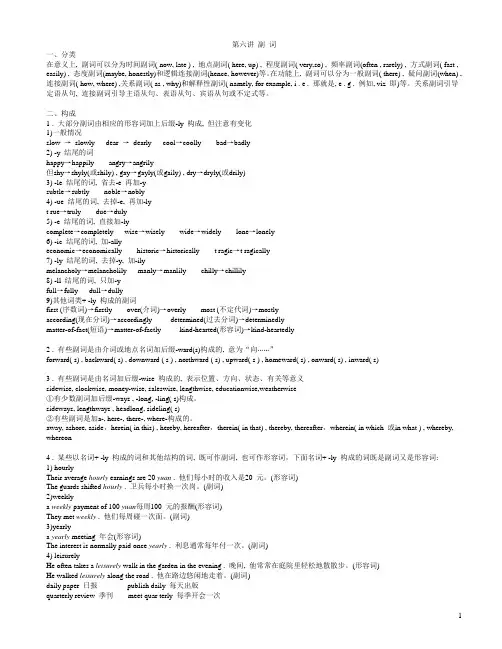
第六讲副词一、分类在意义上, 副词可以分为时间副词( now, late ) , 地点副词( here, up) , 程度副词( very,so) , 频率副词(often , rarely) , 方式副词( fast , easily) , 态度副词(maybe, honestly)和逻辑连接副词(hence, however)等。
在功能上, 副词可以分为一般副词( there) , 疑问副词(when) , 连接副词( how, where) ,关系副词( as , why)和解释性副词( namely, for example, i . e . 那就是, e . g . 例如, viz 即)等。
关系副词引导定语从句, 连接副词引导主语从句、表语从句、宾语从句或不定式等。
二、构成1 . 大部分副词由相应的形容词加上后缀-ly 构成, 但注意有变化1)一般情况slow →slowly dear →dearly cool→coolly bad→badly2) -y 结尾的词happy→happily angry→angrily但shy→shyly(或shily) , gay→gayly(或gaily) , dry→dryly(或drily)3) -le 结尾的词, 省去-e 再加-ysubtle→subtly noble→nobly4) -ue 结尾的词, 去掉-e, 再加-lyt rue→truly due→duly5) -e 结尾的词, 直接加-lycomplete→completely wise→wisely wide→widely lone→lonely6) -ic 结尾的词, 加-allyeconomic→economically historic→historically t ragic→t ragically7) -ly 结尾的词, 去掉-y, 加-ilymelancholy→melancholily manly→manlily chilly→chillily8) -ll 结尾的词, 只加-yfull→fully dull→dully9)其他词类+ -ly 构成的副词first (序数词)→firstly over(介词)→overly most (不定代词)→mostlyaccording(现在分词)→accordingly determined(过去分词)→determinedlymatter-of-fact(短语)→matter-of-factly kind-hearted(形容词)→kind-heartedly2 . 有些副词是由介词或地点名词加后缀-ward(s)构成的, 意为“向⋯⋯”forward( s) , backward( s) , downward ( s ) , northward ( s) , upward( s ) , homeward( s) , onward( s) , inward( s)3 . 有些副词是由名词加后缀-wise 构成的, 表示位置、方向、状态、有关等意义sidewise, clockwise, money-wise, saleswise, lengthwise, educationwise,weatherwise①有少数副词加后缀-ways , -long, -ling( s)构成。
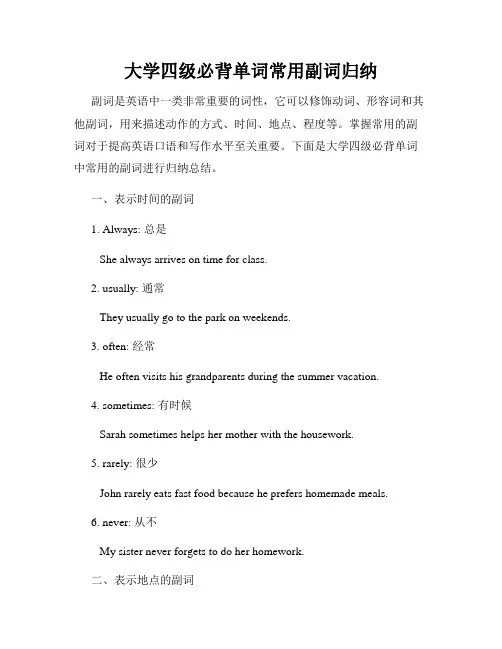
大学四级必背单词常用副词归纳副词是英语中一类非常重要的词性,它可以修饰动词、形容词和其他副词,用来描述动作的方式、时间、地点、程度等。
掌握常用的副词对于提高英语口语和写作水平至关重要。
下面是大学四级必背单词中常用的副词进行归纳总结。
一、表示时间的副词1. Always: 总是She always arrives on time for class.2. usually: 通常They usually go to the park on weekends.3. often: 经常He often visits his grandparents during the summer vacation.4. sometimes: 有时候Sarah sometimes helps her mother with the housework.5. rarely: 很少John rarely eats fast food because he prefers homemade meals.6. never: 从不My sister never forgets to do her homework.二、表示地点的副词1. here: 这里Come here and have a seat.2. there: 那里The museum is over there.3. everywhere: 到处The children left their toys everywhere in the room.4. nowhere: 无处I searched for my keys everywhere, but they were nowhere to be found.5. upstairs: 楼上Please go upstairs and get the book.6. downstairs: 楼下The kitchen is downstairs.三、表示程度的副词1. very: 非常The movie was very interesting.2. extremely: 非常The weather is extremely hot today.3. quite: 相当The cake you made is quite delicious.4. fairly: 相当He is fairly tall for his age.5. really: 真正地She was really happy to see her friends.6. pretty: 相当It was a pretty good performance.四、表示方式的副词1. slowly: 缓慢地The turtle moves slowly.2. quickly: 快速地She finished her homework quickly.3. quietly: 安静地The baby is sleeping quietly.4. loudly: 大声地The music is played loudly in the concert. 5. happily: 快乐地The children were playing happily in the park.6. carefully: 仔细地Please read the instructions carefully before starting.五、其他常用副词1. also: 也He is good at playing the guitar. He also plays the piano.2. even: 甚至She is so tired that she cannot even walk.3. just: 只是I just want to ask a question.4. already: 已经They have already left for the airport.5. still: 仍然The baby is sleeping. He is still asleep.6. yet: 还,尚I haven't finished my homework yet.7. maybe: 也许Maybe we can go to the park tomorrow if it doesn't rain.以上是大学四级必背单词中常见的副词归纳,掌握这些副词的用法和意义,将会对提高英语能力有很大的帮助。

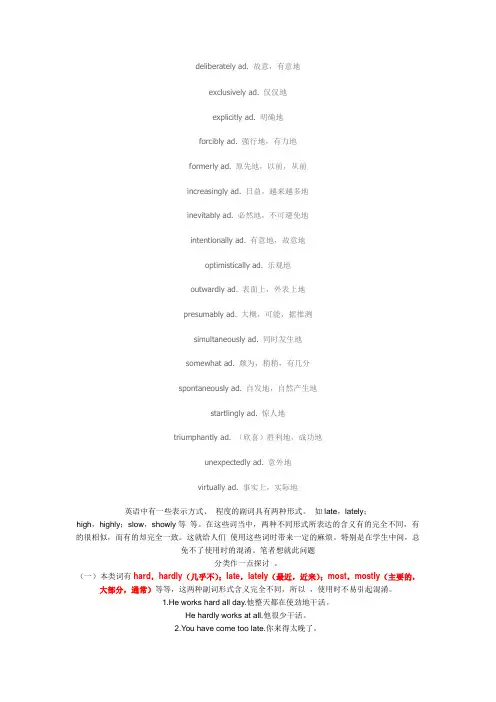
deliberately ad. 故意,有意地exclusively ad. 仅仅地explicitly ad. 明确地forcibly ad. 强行地,有力地formerly ad. 原先地,以前,从前increasingly ad. 日益,越来越多地inevitably ad. 必然地,不可避免地intentionally ad. 有意地,故意地optimistically ad. 乐观地outwardly ad. 表面上,外表上地presumably ad. 大概,可能,据推测simultaneously ad. 同时发生地somewhat ad. 颇为,稍稍,有几分spontaneously ad. 自发地,自然产生地startlingly ad. 惊人地triumphantly ad. (欣喜)胜利地,成功地unexpectedly ad. 意外地virtually ad. 事实上,实际地英语中有一些表示方式、程度的副词具有两种形式。
如late,lately;high,highly;slow,showly等等。
在这些词当中,两种不同形式所表达的含义有的完全不同,有的很相似,而有的却完全一致。
这就给人们使用这些词时带来一定的麻烦。
特别是在学生中间,总免不了使用时的混淆。
笔者想就此问题分类作一点探讨。
(一)本类词有hard,hardly(几乎不);late,lately(最近,近来);most,mostly(主要的,大部分,通常)等等,这两种副词形式含义完全不同,所以,使用时不易引起混淆。
1.He works hard all day.他整天都在使劲地干活。
He hardly works at all.他很少干活。
2.You have come too late.你来得太晚了。
Have you see him lately?你最近见到过他吗?3.The person who talks most is often the one who doesleast.说得最多的人常常干得最少。
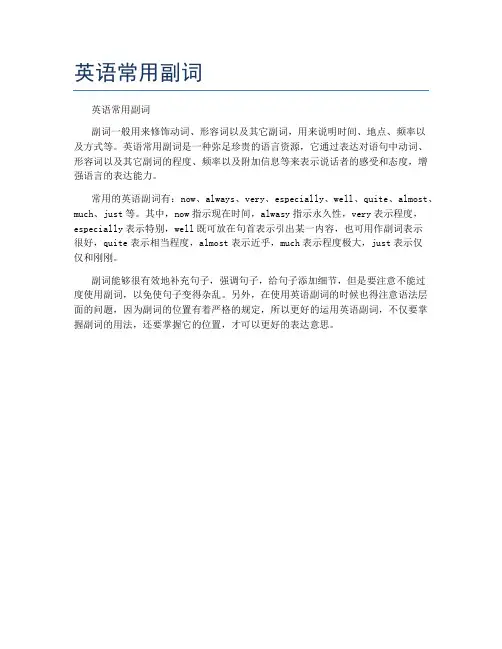
英语常用副词
英语常用副词
副词一般用来修饰动词、形容词以及其它副词,用来说明时间、地点、频率以
及方式等。
英语常用副词是一种弥足珍贵的语言资源,它通过表达对语句中动词、形容词以及其它副词的程度、频率以及附加信息等来表示说话者的感受和态度,增强语言的表达能力。
常用的英语副词有:now、always、very、especially、well、quite、almost、much、just等。
其中,now指示现在时间,alwasy指示永久性,very表示程度,especially表示特别,well既可放在句首表示引出某一内容,也可用作副词表示
很好,quite表示相当程度,almost表示近乎,much表示程度极大,just表示仅
仅和刚刚。
副词能够很有效地补充句子,强调句子,给句子添加细节,但是要注意不能过
度使用副词,以免使句子变得杂乱。
另外,在使用英语副词的时候也得注意语法层面的问题,因为副词的位置有着严格的规定,所以更好的运用英语副词,不仅要掌握副词的用法,还要掌握它的位置,才可以更好的表达意思。
英语常见副词英语常见副词50个如下:1.always:总是,一直2.often:经常3.sometimes:有时4.seldom:很少5.never:从不6.immediately:立即7.finally:最后8.recently:最近9.luckily:幸运地10.carefully:仔细地11.bravely:勇敢地12.beautifully:美丽地13.excitedly:兴奋地14.sincerely:真诚地15.hurriedly:匆忙地16.curiously:好奇地17.hopefully:希望地18.patiently:耐心地19.gratefully:感激地20.generously:慷慨地21.indirectly:间接地22.frequently:频繁地23.loudly:大声地24.proudly:自豪地25.secretly:秘密地26.smoothly:顺利地27.suddenly:突然28.passionately:热情地29.confidently:自信地30.gratefully:感激地31.roughly:粗略地32.responsibly:负责任地33.peacefully:和平地34.luckily:幸运地35.successfully:成功地36.luckily:幸运地37.creatively:创造性地38.efficiently:高效地39.ambitiously:雄心壮志地40.cautiously:谨慎地41.painstakingly:刻苦地42.unwillingly:不乐意地43.respectively:分别地44.wholeheartedly:全心全意地45.unexpectedly:出乎意料地46.understandably:可理解地47.unexpectedly:出乎意料地48.thankfully:感激地49.fortunately:幸运地50.eventually:最终。
【大学英语四级语法:副词及其基本用法】
注意:
a. 大多数方式副词位于句尾,但宾语过长,副词可以提前,以使句子平衡。
We could see very clearly a strange light ahead of us.
b. 方式副词well,badly糟、坏,hard等只放在句尾。
He speaks English well.
二、副词的排列顺序:
1) 时间,地点副词,小单位的在前,大单位在后。
2) 方式副词,短的在前,长的在后,并用and或but等连词连接。
Please write slowly and carefully.
3) 多个不同副词排列:程度+地点+方式+时间副词。
注意:副词very 可以修饰形容词,但不能修饰动词。
改错:(错) I very like English.
(对) I like English very much.
注意:副词enough要放在形容词的后面,形容词enough放在名词前后都可。
I don t know him well enough.
There is enough food for everyone to eat.
There is food enough for everyone to eat.。
四级词汇大全常用副词汇总副词在英语中起着非常重要的作用,能够用来修饰动词、形容词、其他副词以及整个句子,使其更具表达力和准确性。
在四级考试中,熟练掌握常用副词对于提高写作和阅读能力至关重要。
本文将为大家总结四级词汇大全中常用的副词,以帮助大家在考试中取得好成绩。
一、时间副词1. Always –总是例句:He always arrives early for class.2. Usually –通常例句:I usually go to the gym after work.3. Sometimes –有时例句:Sometimes, it's better to stay silent.4. Often –经常例句:She often stays up late to study.5. Never –从不例句:I never eat fast food.二、程度副词1. Very –非常例句:She is very happy with her new job.2. Quite –相当例句:The movie was quite interesting.3. Extremely –极其例句:The weather is extremely hot today.4. Enough –足够地例句:There is enough food for everyone.5. Too –太,过于例句:He ate too much and felt sick.三、方式副词1. Slowly –慢慢地例句:She walked slowly along the beach.2. Carefully –仔细地例句:Please handle this fragile item carefully.3. Loudly –大声地例句:The crowd cheered loudly at the concert.4. Quietly –安静地例句:Please speak quietly in the library.5. Well –好地例句:He plays the piano very well.四、位置副词1. Here –这里例句:Come and sit here next to me.2. There –那里例句:She lives there, just across the street.3. Behind –在……后面例句:The book is behind the vase on the shelf. 4. In front of –在……前面例句:Please wait in front of the building.5. Outside –外面例句:The children are playing outside in the yard.五、频率副词1. Daily –每天例句:He goes for a run daily to stay fit.2. Monthly –每月例句:She pays her bills monthly.3. Yearly –每年例句:I visit my hometown yearly during the holidays.4. Regularly –定期地例句:The doctor advised him to exercise regularly. 5. Occasionally –有时例句:We occasionally go to the theater on weekends.六、目的副词1. Purposefully –有目的地例句:She walked purposefully towards the exit.2. Deliberately –故意地例句:He deliberately ignored my question.3. Intentionally –有意地例句:They intentionally arrived late to the party.4. Accidentally –意外地例句:I accidentally spilled coffee on my shirt.5. Carelessly –粗心地例句:He carelessly left his phone on the bus.以上就是四级词汇大全中常用的副词总结。
2023年大学英语六级副词表大全(带音标)一、时间副词 (Time Adverbs)1. always [ˈɔːlweɪz] - 总是2. usually [ˈjuːʒʊli] - 通常3. often [ˈɔːfn] - 经常4. sometimes [ˈsʌmtaɪmz] - 有时5. rarely [ˈrerli] - 很少6. never [ˈnevər] - 从不7. now [naʊ] - 现在8. then [ðen] - 然后9. soon [suːn] - 不久10. already [ɔːlˈrɛdi] - 已经11. yet [jɛt] - 还12. recently [ˈrisəntli] - 最近13. currently [ˈkɝːəntli] - 目前14. immediately [ɪˈmiːdiətli] - 立即二、程度副词 (Degree Adverbs)1. very [ˈvɛri] - 非常2. quite [kwaɪt] - 相当3. extremely [ɪkˈstriːmli] - 极其4. really [ˈriːli] - 真的5. totally [ˈtoʊtəli] - 完全6. too [tuː] - 太7. enough [ɪˈnʌf] - 足够8. fairly [ˈfɛrli] - 公正地9. quite [kwaɪt] - 相当10. barely [ˈbɛrli] - 勉强11. partly [ˈpɑːrtli] - 部分地12. slightly [ˈslaɪtli] - 稍微三、方式副词 (Manner Adverbs)1. slowly [ˈsloʊli] - 慢慢地2. quickly [ˈkwɪkli] - 快速地3. carefully [ˈkɛrf l i] - 小心地4. easily [ˈiːzi] - 容易地5. loudly [ˈlaʊdli] - 大声地6. quietly [ˈkwaɪətli] - 安静地7. actively [ˈæktɪvli] - 积极地8. passively [ˈpæsɪvli] - 被动地9. clearly [ˈklɪrli] - 清楚地10. fluently [ˈfluːəntli] - 流利地11. skillfully [ˈskɪlfəli] - 熟练地12. beautifully [ˈbjutəf l i] - 美丽地四、地点副词 (Place Adverbs)1. here [hɪr] - 这里2. there [ðer] - 那里3. everywhere [ˈɛvrɪwɛr] - 到处4. nowhere [ˈnoʊwɛr] - 无处5. inside [ɪnˈsaɪd] - 里面6. outside [aʊtˈsaɪd] - 外面7. nearby [ˈnɪrˈbaɪ] - 附近8. far [fɑːr] - 远离9. away [əˈweɪ] - 远离10. abroad [əˈbrɔːd] - 国外11. home [hoʊm] - 家12. upstairs [ˈʌpˈstɛrz] - 楼上13. downstairs [ˌdaʊnˈstɛrz] - 楼下14. anywhere [ˈɛniˌwɛr] - 任何地方五、频率副词 (Frequency Adverbs)1. always [ˈɔːlweɪz] - 总是2. u sually [ˈjuːʒʊli] - 通常3. often [ˈɔːfn] - 经常4. sometimes [ˈsʌmtaɪmz] - 有时5. rarely [ˈrerli] - 很少6. never [ˈnevər] - 从不7. occasionally [əˈkeɪʒənəli] - 偶尔8. frequently [ˈfriːkwəntli] - 频繁地9. repeatedly [rɪˈpiːtɪdli] - 反复地10. seldom [ˈsɛldəm] - 很少11. consistently [kənˈsɪstəntli] - 一贯地12. occasionally [əˈkeɪʒənəli] - 有时候以上为2023年大学英语六级副词表大全(带音标)。